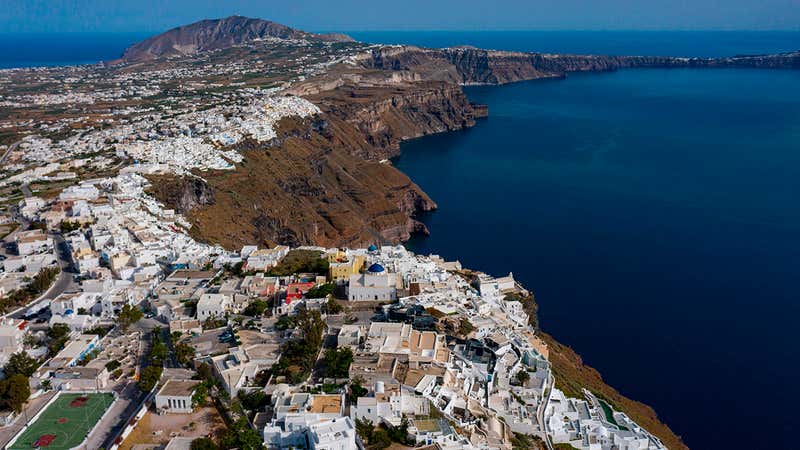Unprecedented seismic activity has taken hold of the renowned Greek island of Santorini, a major tourist hotspot, leading to a wave of evacuations and heightened anxiety. In just the past week, over 1,000 earthquakes have been recorded in and around the island, some of which measured as high as 5.2 on the Richter scale. While no casualties or significant structural damage have yet been reported, the sheer frequency of the tremors is unusual, throwing inhabitants and authorities into a state of high alert.
Greek Prime Minister Kyriakos Mitsotakis addressed the nation and the global community, urging calm while also acknowledging the seriousness of the situation. “The constant trembling of Santorini is disconcerting, and the fear is understandable. We will do all we can to protect lives and minimize disruptions,” Mitsotakis stated.
With seismic activity concentrated just 15 miles off Santorini’s coast in the Aegean Sea, authorities are already enforcing emergency protocols. The Euro-Mediterranean Seismological Centre confirmed that while the earthquakes’ epicenters remain underwater, they are moving northward—a trend that experts believe might persist for weeks.
The consequences have been nearly immediate. More than 7,000 residents and visitors have fled the island as ferry operators and airlines scramble to handle the increasing departure load. Schools have been closed not only in Santorini but also in other neighboring islands, as local officials prepare for what some speculate could be a prelude to even larger seismic occurrences.
Uncertainty looms around the nature and evolution of this seismic swarm. Efthimios Lekkas, head of Greece’s Earthquake Planning and Protection Organization, clarified that despite Santorini sitting atop a dormant volcano last active in 1950, these tremors are not linked to volcanic activity. However, a scientific panel is closely monitoring levels within Santorini’s caldera for any abnormal behavior.
For now, local officials have banned access to some of the island’s most vulnerable coastal regions in hopes of preventing accidental injuries. In addition, public events have been suspended, and residents have been encouraged to organize emergency kits and remain vigilant. To assist in these scrutinizing times, the Greek government has modified its digital platform, mysafetyplan.gov.gr, to include real-time maps of designated evacuation points.
Local attitudes toward the crisis have varied. Panagiotis Hatzigeorgiou, a 30-year resident of the island, shared his perspective: “We have been accustomed to earthquakes on Santorini. This, though, is different. The earth shakes every few minutes—it’s hard to rest, let alone make plans.”
On the broader scale, Greece—a country that is no stranger to seismic movements due to its geographical positioning along major fault lines—is now reinforcing its national earthquake preparedness strategies. Civil Protection Minister Vassilis Kikilias announced that coast guard vessels and military landing crafts have been placed on standby, prepared for rapid evacuations should conditions worsen. Emergency telecommunications units, generators, and satellite equipment have also been deployed across Santorini and the neighboring islands of Anafi, Ios, and Amorgos.
The crisis has not only upended everyday life but has also dealt a sharp blow to Santorini’s tourism-dependent economy. The island, which welcomed over 3.4 million visitors in 2023, has seen a rapid decline in tourist arrivals over the past few days. Fear of getting stranded further compounds the crisis, as rough weather conditions occasionally disrupt ferry schedules.
While modern science provides increasingly sophisticated methods for analyzing seismic data, experts remain unable to predict seismic events with certainty. “Earthquake forecasting is unfortunately still an impossibility in modern seismology,” Efthimios Lekkas reiterated. Indicators suggest the quake swarm may either fizzle out over time or act as a precursor to a more significant event. Officials continue to urge caution but assert that there is no way to determine a definitive timeline for when the activity might decrease.
Currently, the island’s local economy and residents brace for what could be a prolonged state of emergency.
As it stands, the situation in Santorini is a delicate balancing act. The Greek government and international experts are urging residents and visitors alike to remember that prioritizing safety remains paramount in times of natural uncertainty. The days ahead will undoubtedly be telling for an island that has become emblematic not only of Greek history and beauty but also of resilience in the face of nature’s unpredictability.



